人教PEP版六年级上册语法讲解与强化训练 Unit 6 How do you feel(含答案)
文档属性
| 名称 | 人教PEP版六年级上册语法讲解与强化训练 Unit 6 How do you feel(含答案) | 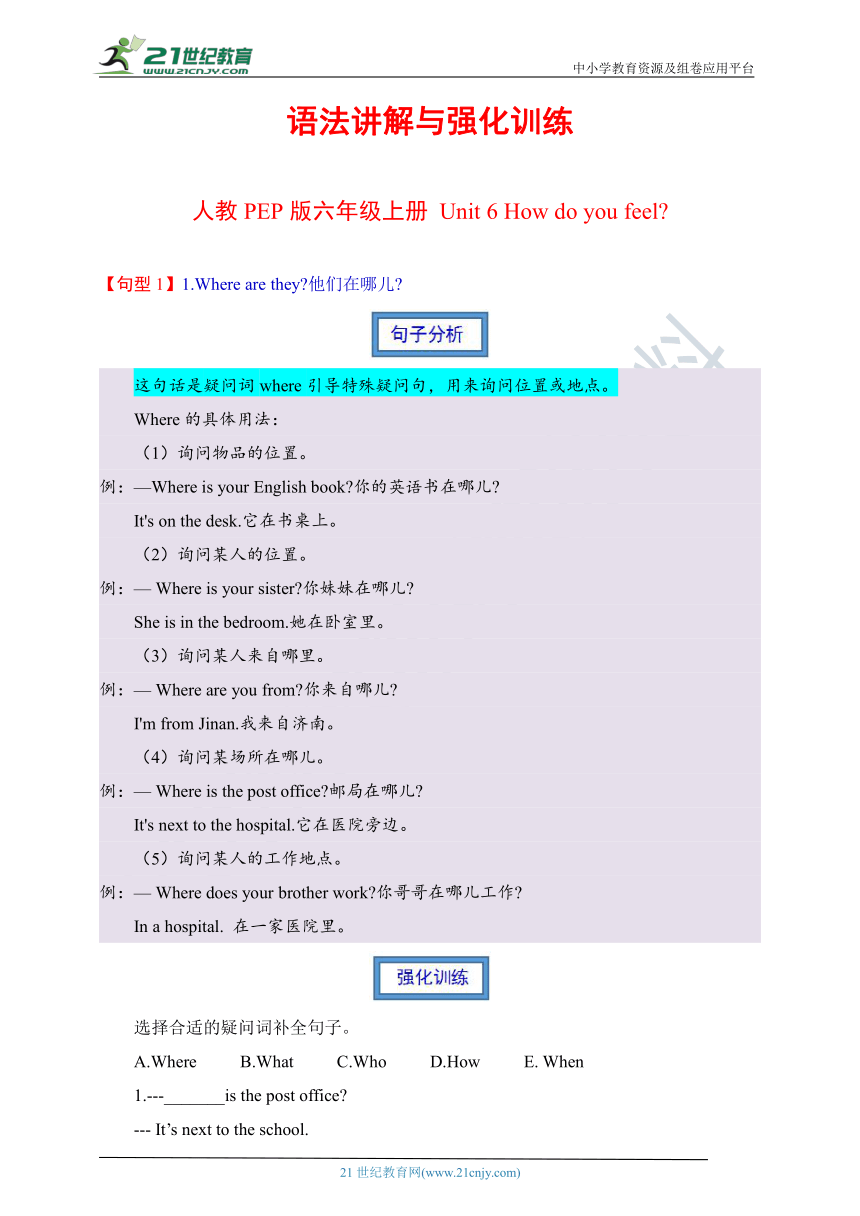 | |
| 格式 | doc | ||
| 文件大小 | 1.3MB | ||
| 资源类型 | 试卷 | ||
| 版本资源 | 人教版(PEP) | ||
| 科目 | 英语 | ||
| 更新时间 | 2022-09-20 17:01:11 | ||
图片预览

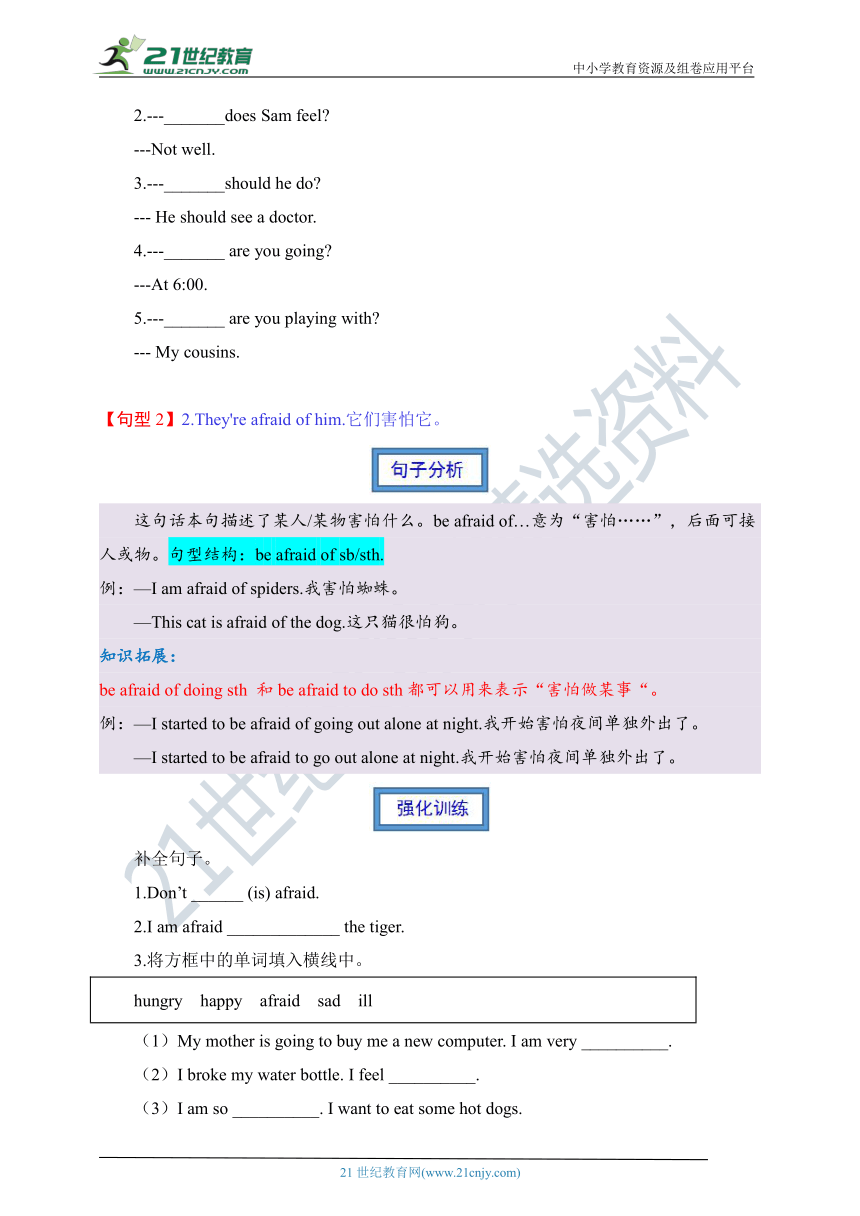
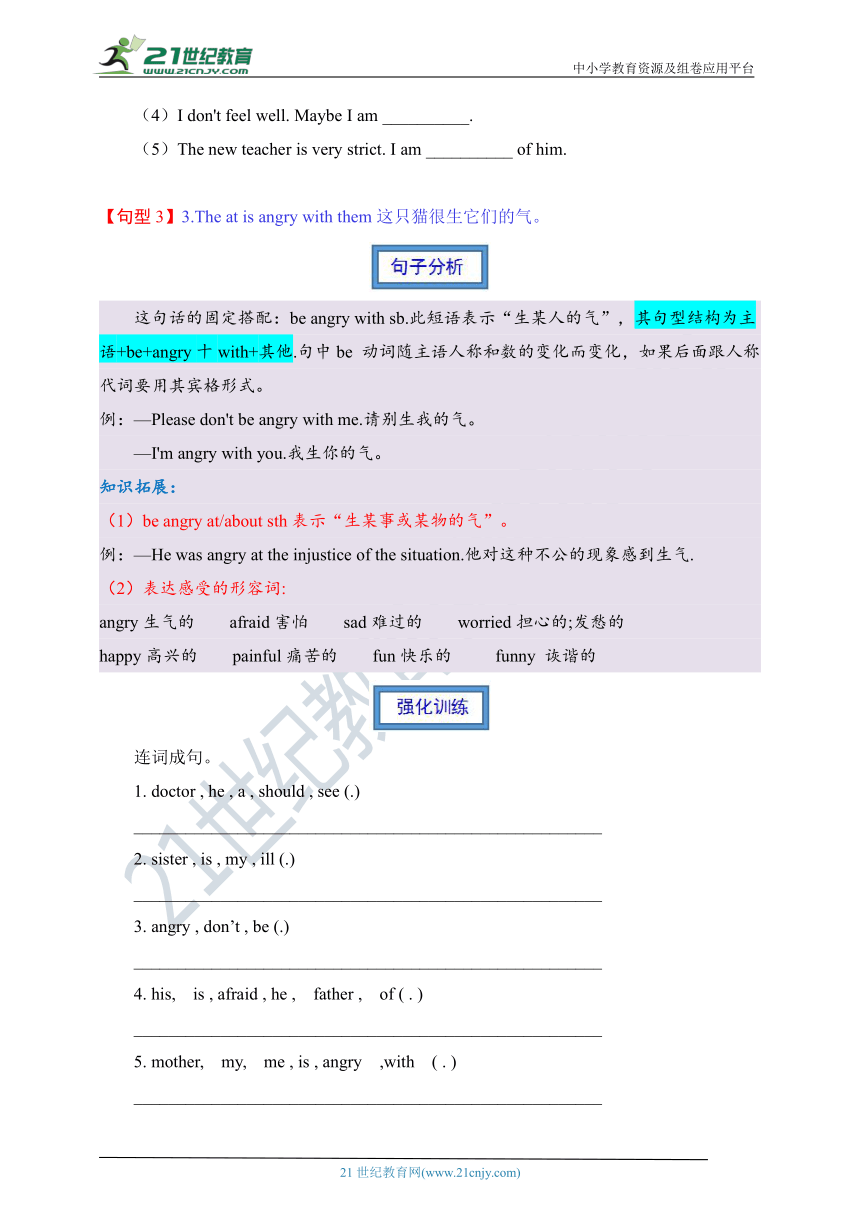
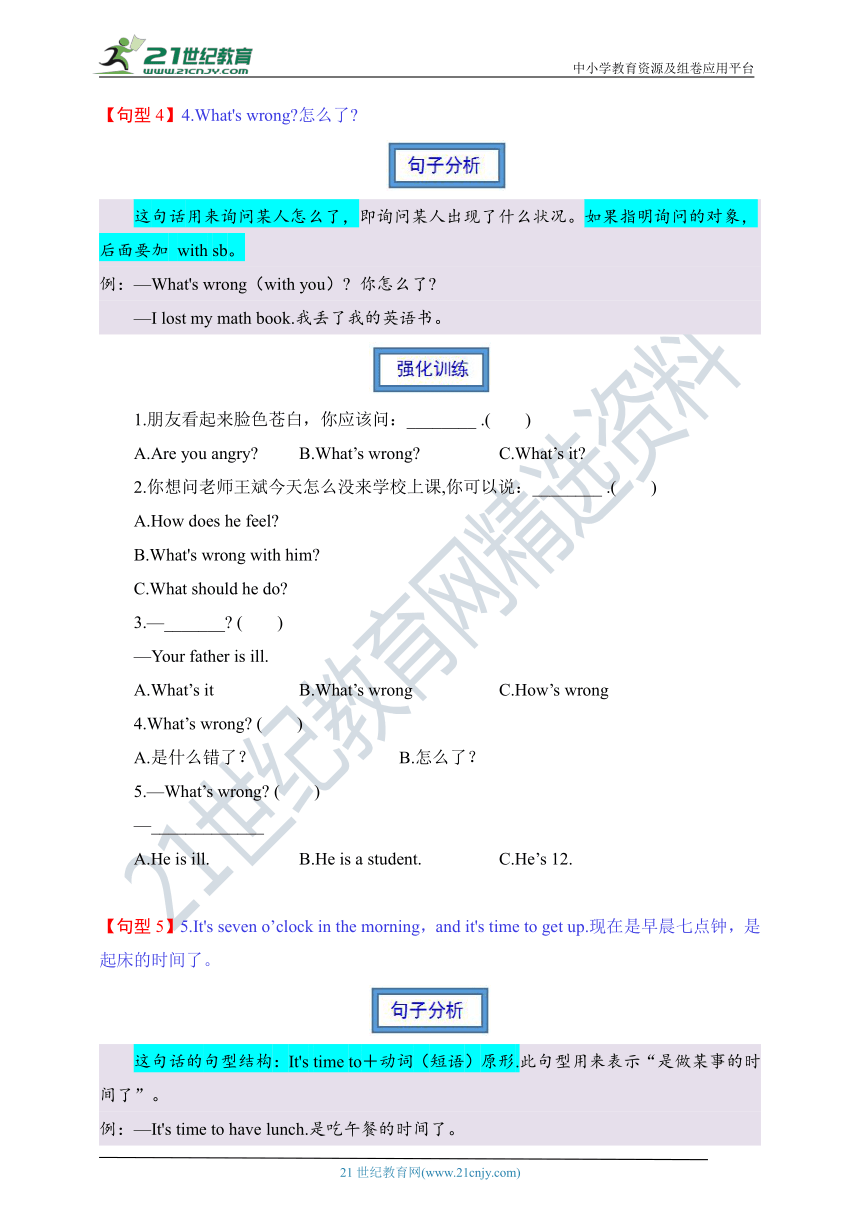
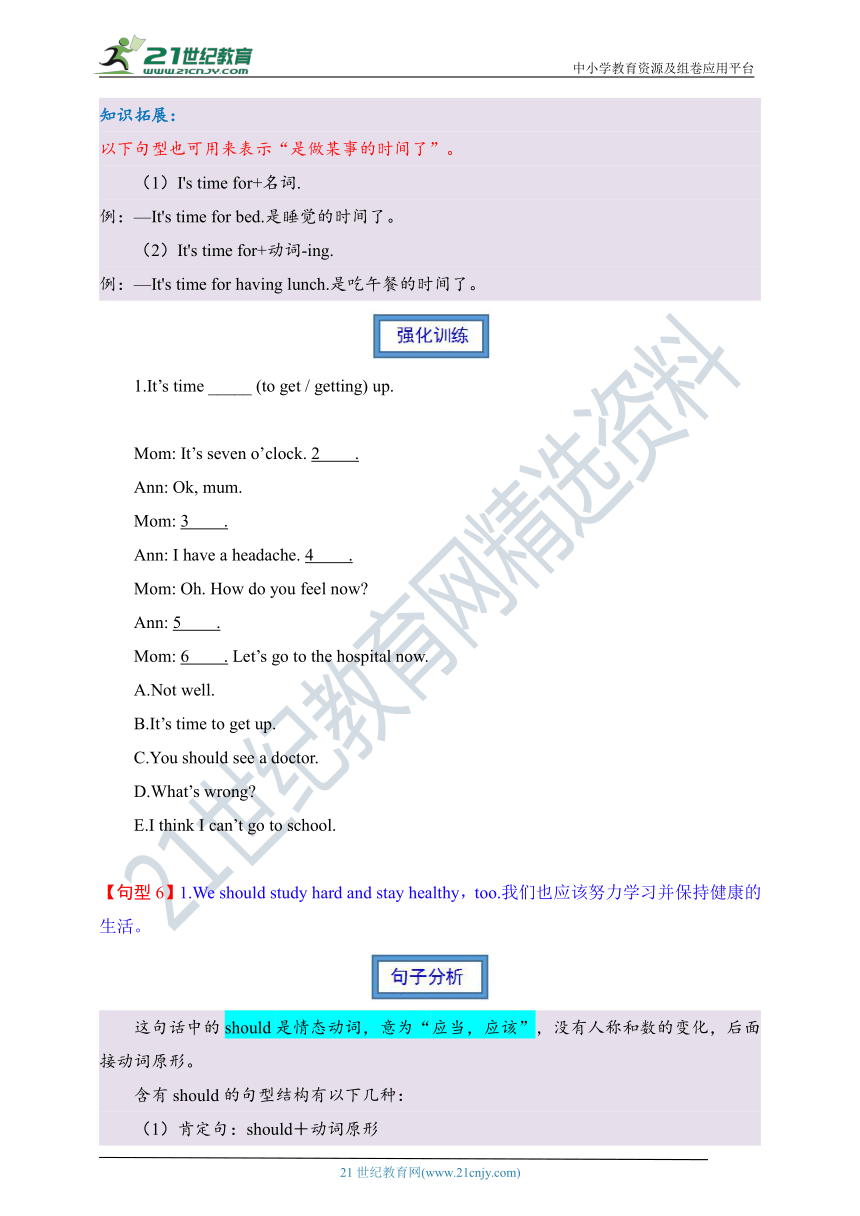
文档简介
中小学教育资源及组卷应用平台
语法讲解与强化训练
人教PEP版六年级上册 Unit 6 How do you feel
【句型1】1.Where are they 他们在哪儿
这句话是疑问词where引导特殊疑问句,用来询问位置或地点。
Where的具体用法:
(1)询问物品的位置。
例:—Where is your English book 你的英语书在哪儿
It's on the desk.它在书桌上。
(2)询问某人的位置。
例:— Where is your sister 你妹妹在哪儿
She is in the bedroom.她在卧室里。
(3)询问某人来自哪里。
例:— Where are you from 你来自哪儿
I'm from Jinan.我来自济南。
(4)询问某场所在哪儿。
例:— Where is the post office 邮局在哪儿
It's next to the hospital.它在医院旁边。
(5)询问某人的工作地点。
例:— Where does your brother work 你哥哥在哪儿工作
In a hospital. 在一家医院里。
选择合适的疑问词补全句子。
A.Where B.What C.Who D.How E. When
1.---_______is the post office
--- It’s next to the school.
2.---_______does Sam feel
---Not well.
3.---_______should he do
--- He should see a doctor.
4.---_______ are you going
---At 6:00.
5.---_______ are you playing with
--- My cousins.
【句型2】2.They're afraid of him.它们害怕它。
这句话本句描述了某人/某物害怕什么。be afraid of…意为“害怕……”,后面可接人或物。句型结构:be afraid of sb/sth.
例:—I am afraid of spiders.我害怕蜘蛛。
—This cat is afraid of the dog.这只猫很怕狗。
知识拓展:
be afraid of doing sth 和be afraid to do sth都可以用来表示“害怕做某事“。
例:—I started to be afraid of going out alone at night.我开始害怕夜间单独外出了。
—I started to be afraid to go out alone at night.我开始害怕夜间单独外出了。
补全句子。
1.Don’t ______ (is) afraid.
2.I am afraid _____________ the tiger.
3.将方框中的单词填入横线中。
hungry happy afraid sad ill
(1)My mother is going to buy me a new computer. I am very __________.
(2)I broke my water bottle. I feel __________.
(3)I am so __________. I want to eat some hot dogs.
(4)I don't feel well. Maybe I am __________.
(5)The new teacher is very strict. I am __________ of him.
【句型3】3.The at is angry with them这只猫很生它们的气。
这句话的固定搭配:be angry with sb.此短语表示“生某人的气”,其句型结构为主语+be+angry十with+其他.句中be 动词随主语人称和数的变化而变化,如果后面跟人称代词要用其宾格形式。
例:—Please don't be angry with me.请别生我的气。
—I'm angry with you.我生你的气。
知识拓展:
(1)be angry at/about sth表示“生某事或某物的气”。
例:—He was angry at the injustice of the situation.他对这种不公的现象感到生气.
(2)表达感受的形容词:
angry生气的 afraid害怕 sad难过的 worried担心的;发愁的
happy高兴的 painful痛苦的 fun快乐的 funny 诙谐的
连词成句。
1. doctor , he , a , should , see (.)
______________________________________________________
2. sister , is , my , ill (.)
______________________________________________________
3. angry , don’t , be (.)
______________________________________________________
4. his, is , afraid , he , father , of ( . )
______________________________________________________
5. mother, my, me , is , angry ,with ( . )
______________________________________________________
【句型4】4.What's wrong 怎么了
这句话用来询问某人怎么了,即询问某人出现了什么状况。如果指明询问的对象,后面要加 with sb。
例:—What's wrong(with you) 你怎么了
—I lost my math book.我丢了我的英语书。
1.朋友看起来脸色苍白,你应该问:________ .( )
A.Are you angry B.What’s wrong C.What’s it
2.你想问老师王斌今天怎么没来学校上课,你可以说:________ .( )
A.How does he feel
B.What's wrong with him
C.What should he do
3.—_______ ( )
—Your father is ill.
A.What’s it B.What’s wrong C.How’s wrong
4.What’s wrong ( )
A.是什么错了? B.怎么了?
5.—What’s wrong ( )
—_____________
A.He is ill. B.He is a student. C.He’s 12.
【句型5】5.It's seven o’clock in the morning,and it's time to get up.现在是早晨七点钟,是起床的时间了。
这句话的句型结构:It's time to+动词(短语)原形.此句型用来表示“是做某事的时间了”。
例:—It's time to have lunch.是吃午餐的时间了。
知识拓展:
以下句型也可用来表示“是做某事的时间了”。
(1)I's time for+名词.
例:—It's time for bed.是睡觉的时间了。
(2)It's time for+动词-ing.
例:—It's time for having lunch.是吃午餐的时间了。
1.It’s time _____ (to get / getting) up.
Mom: It’s seven o’clock. 2 .
Ann: Ok, mum.
Mom: 3 .
Ann: I have a headache. 4 .
Mom: Oh. How do you feel now
Ann: 5 .
Mom: 6 . Let’s go to the hospital now.
A.Not well.
B.It’s time to get up.
C.You should see a doctor.
D.What’s wrong
E.I think I can’t go to school.
【句型6】1.We should study hard and stay healthy,too.我们也应该努力学习并保持健康的生活。
这句话中的should是情态动词,意为“应当,应该”,没有人称和数的变化,后面接动词原形。
含有should的句型结构有以下几种:
(1)肯定句:should+动词原形
例:—We should study hard.我们应该好好学习。
(2)否定句:shouldn't+动词原形
例:—You shouldn't say that.你不应该说那话。
(3)疑问句:should+主语+动词原形+其他
例:—Should we go to visit grandfather today 今天我们应该去看望祖父吗
A.You should always be kind to others.B.You should do more exercise.C.You should see a doctor.D.You should wear warm clothes.E. You should take a deep breath and count to ten.
1.I feel ill. What should I do ( )
2.I feel cold. What should I do ( )
3.I feel angry. What should I do ( )
4.I don't have any friends. I feel sad. What should I do ( )
5.I feel tired. What should I do ( )
【句型7】7.Don't be sad.别伤心。
这句话是祈使句的否定句。因为 sad意为“难过的”,是形容词,所以构成祈使句的 don't后面用了原形 be,表示“不要……”。
析使句表示请求、命令、叮嘱、劝告等。析使句有肯定形式和否定形式两种,肯定形式通常以实义动词原形开头,否定形式通常以“don't+动词原形”开头。析使句的主语通常都省路。
例:—Close the window,please.请关上窗户。
—Be quiet,please!请保持安静!
—Don't be afraid/angry/sad.别害怕/生气/伤心。
1.Don't ________ sad, Tom. ( )
A.be B.is C.are
2.Don't ________.( )
A.worry B.worried C.be worry
3.Don't ________ worried. Let me help you. ( )
A.be B.are C./
4.Don't________ sad, Tom. ( )
A.is B.be C.are
5.Don't________. I won't sit on you. ( )
A.be worried B.happy C.be worry
【句型8】8.If you like science,you can be a scientist.如果你喜欢科学,你可以成为一名科学家。
这句话中的if意为“假设,如果”,它引导的句子在整个句子中作一个表示条件的状语,说明事情发生的条件或假设情况,我们把这个句子叫做条件状语从句。
例:—If he comes to my party,I'll be happy.如果他来参加我的聚会,我会很高兴。
—If you study hard,you will get a high grade.如果你努力学习,你就会得到高分。
Mrs Green has a happy family. Her husband (丈夫) is very smart. He is the manager (经理) of a supermarket. He works very hard. He is very busy, but he always helps Mrs Green do some housework. Mr and Mrs Green have two children, their son Tony and their daughter Jenny. Tony is 13 and Jenny is 11. Tony is tall and strong. He likes sports. Jenny is very good at playing the piano. She can sing while playing the guitar too. Both Tony and Jenny like reading. They often go to the bookshop and read. On Sundays and Saturdays the family often go to different places in the city.
1.There are four people in Mrs Green’s family.( )
2.Mr Green works in a supermarket.( )
3.Tony is very good at guitar.( )
4.Tony and Jenny both like music. They often sing songs.( )
5.Mr Green and his family often go to different places in the city on the weekend.( )
参考答案
强化训练1
1.A【解析】句意为“—邮局在_____?—它紧挨着学校。”根据答语可判断该空应填where,故答案为A。
2.D【解析】句意为“—萨姆感觉_____?—不是很好。”根据答语可知该空用how,故答案为D。
3.B【解析】句意为“—他应该做_____?—他应该去看医生。”根据答语改空应填what,故答案为B。
4.E【解析】句意为“—你要______去?—在六点。” 根据答语该空应填when,故答案为E。
5.C【解析】句意为“—你正在和______玩?—我的堂兄们。” 根据答语该空应填who,故答案为C。
强化训练2
1.be【解析】略。
2.of【解析】略。
3.(1)happy【解析】句意:我妈妈打算给我买一台新电脑。我非常_____。根据句意及所给单词提示可知该空填happy高兴的,故答案为happy。
(2)sad【解析】句意:我弄坏了水瓶。我感觉很_____。根据句意及所给单词提示可知该空填sad难过的,故答案为sad。
(3)hungry【解析】句意:我很____。我想吃热狗。根据句意及所给单词提示可知该空填hungry饿的,故答案为hungry。
(4)ill【解析】句意:我感觉身体不舒服。可能我_____。根据句意及所给单词提示可知该空填ill生病的,故答案为ill。
(5)afraid【解析】句意:这个新老师非常严厉。我很______他。根据句意及所给单词提示可知该空填afraid,be afraid of害怕,故答案为afraid。
强化训练3
1.He should see a doctor .【解析】句意:他应该去看病。“see a doctor”为固定短语,本句的句型结构为:主语+should+动词原形+其他。
2.My sister is ill .【解析】句意:我妹妹病了。根据句子结构:主语+be动词+其他,可以把这句话连接起来。
3. Don’t be angry .【解析】句意:别生气。这是由Don’t引导的祈使句,句型结构为Don’t+be+其他。
4. He is afraid of his father .【解析】句意:他害怕他的爸爸。这是询问他人害怕的句型,基本结构为主语+be动词+afraid of +其他,可以根据此结构连接这句话。
5. My mother is angry with me .【解析】句意:我妈妈很生我的气。这是表达生气的句型。基本结构为:主语+be动词+angry with+其他。
强化训练4
1.B【解析】略。
2.B【解析】略。
3.B【解析】—_________?—你父亲病了。A它是什么,B怎么了,C没有此用法。由答语可知问句是问怎么了,故选B。
4.B【解析】What’s wrong 怎么了?故选B。
5.A【解析】问句句意:怎么了?A他生病了。B他是个学生。C他12岁。B、C均不符合语境,故选A。
强化训练5
1.to get【解析】句子含义为“该起床了。”,it's time to do sth意为“是做某事的时候了”,故答案为to get。
2.B【解析】句意:现在是7点。所以到起床的时间了,故选B。
3.D【解析】句意:我头疼。由句子可知头疼,所以问句是:D.What’s wrong 怎么了?故选D。
4.E【解析】由句子可知头疼,所以没法上学了,故选E。
5.A【解析】句意:你现在感觉怎么样?问的是感觉,所以回答是:A.Not well.不好。故选A。
6.C【解析】句意:让我们现在去医院吧。由句子可知要去看医生,故选C。
强化训练6
1.C【解析】句意:我感觉生病了。我该怎么办?答句给出建议,生病了应该看医生,C选项是你应该看医生。符合语境,故选C。
2.D【解析】句意:我感觉冷。我该怎么办?答句给出建议,冷应该穿暖和,D选项是你应该穿暖和的衣服。符合语境,故选D。
3.E【解析】句意:我感觉很生气。我应该怎么办?答句给出建议,E选项是你应该深呼吸,数到十。 符合语境,故选E。
4..A【解析】句意:我没有任何朋友。我感觉很伤心。我该怎么办?答句给出建议,A选项是 你应该一直友好待 人。 符合语境,故选A。
5.B【解析】句意:我感觉很疲倦。我应该怎么办?答句给出建议,B选项是你应该多做运动。符合语境,故选B。
强化训练7
1.A【解析】句意:别伤心,汤姆。祈使句否定形式结构Don't+动词原形+其他,故选A。
2.A【解析】略。
3.A【解析】句意:不要担心。让我帮你吧。该句是由Don't+动词原形构成的祈使句否定句,所以要填动词原形,A选项是动词原形,故选A。
4.B【解析】句意:不要难过,汤姆。Don't+动词原形,故选B。
5.A【解析】略。
强化训练8
文章主要介绍了格林太太一家人,他们的工作及喜好等。
1T【解析】句意:格林太太家有四口人。根据文中句子可知她家里有Her husband,two children,Mrs Green,一共四人,故答案为T。
2.T【解析】句意:格林先生在超市工作。根据文中句子He is the manager (经理) of a supermarket.可知他是一名超市经理,所以他在超市工作,故答案为T。
3.F【解析】句意:托尼很擅长弹吉他。根据文中句子Jenny is very good at playing the piano. She can sing while playing the guitar too.可知珍妮弹钢琴弹得很好,她弹吉他的时候也会唱歌。可知时珍妮擅长弹吉他不是托尼,故答案为F。
4.F【解析】句意:托尼和珍呢都喜欢音乐。他们经常唱歌。根据文中句子Both Tony and Jenny like reading. They often go to the bookshop and read. 可知他们都喜欢读书,他们经常去书店看书。不是音乐,故答案为F。
5.T【解析】句意:格林先生和他的家人周末经常去城里的不同地方。根据文中句子On Sundays and Saturdays the family often go to different places in the city.可知星期天和星期六,这家人经常去城里的不同地方。故答案为T。
21世纪教育网 www.21cnjy.com 精品试卷·第 2 页 (共 2 页)
HYPERLINK "http://21世纪教育网(www.21cnjy.com)
" 21世纪教育网(www.21cnjy.com)
语法讲解与强化训练
人教PEP版六年级上册 Unit 6 How do you feel
【句型1】1.Where are they 他们在哪儿
这句话是疑问词where引导特殊疑问句,用来询问位置或地点。
Where的具体用法:
(1)询问物品的位置。
例:—Where is your English book 你的英语书在哪儿
It's on the desk.它在书桌上。
(2)询问某人的位置。
例:— Where is your sister 你妹妹在哪儿
She is in the bedroom.她在卧室里。
(3)询问某人来自哪里。
例:— Where are you from 你来自哪儿
I'm from Jinan.我来自济南。
(4)询问某场所在哪儿。
例:— Where is the post office 邮局在哪儿
It's next to the hospital.它在医院旁边。
(5)询问某人的工作地点。
例:— Where does your brother work 你哥哥在哪儿工作
In a hospital. 在一家医院里。
选择合适的疑问词补全句子。
A.Where B.What C.Who D.How E. When
1.---_______is the post office
--- It’s next to the school.
2.---_______does Sam feel
---Not well.
3.---_______should he do
--- He should see a doctor.
4.---_______ are you going
---At 6:00.
5.---_______ are you playing with
--- My cousins.
【句型2】2.They're afraid of him.它们害怕它。
这句话本句描述了某人/某物害怕什么。be afraid of…意为“害怕……”,后面可接人或物。句型结构:be afraid of sb/sth.
例:—I am afraid of spiders.我害怕蜘蛛。
—This cat is afraid of the dog.这只猫很怕狗。
知识拓展:
be afraid of doing sth 和be afraid to do sth都可以用来表示“害怕做某事“。
例:—I started to be afraid of going out alone at night.我开始害怕夜间单独外出了。
—I started to be afraid to go out alone at night.我开始害怕夜间单独外出了。
补全句子。
1.Don’t ______ (is) afraid.
2.I am afraid _____________ the tiger.
3.将方框中的单词填入横线中。
hungry happy afraid sad ill
(1)My mother is going to buy me a new computer. I am very __________.
(2)I broke my water bottle. I feel __________.
(3)I am so __________. I want to eat some hot dogs.
(4)I don't feel well. Maybe I am __________.
(5)The new teacher is very strict. I am __________ of him.
【句型3】3.The at is angry with them这只猫很生它们的气。
这句话的固定搭配:be angry with sb.此短语表示“生某人的气”,其句型结构为主语+be+angry十with+其他.句中be 动词随主语人称和数的变化而变化,如果后面跟人称代词要用其宾格形式。
例:—Please don't be angry with me.请别生我的气。
—I'm angry with you.我生你的气。
知识拓展:
(1)be angry at/about sth表示“生某事或某物的气”。
例:—He was angry at the injustice of the situation.他对这种不公的现象感到生气.
(2)表达感受的形容词:
angry生气的 afraid害怕 sad难过的 worried担心的;发愁的
happy高兴的 painful痛苦的 fun快乐的 funny 诙谐的
连词成句。
1. doctor , he , a , should , see (.)
______________________________________________________
2. sister , is , my , ill (.)
______________________________________________________
3. angry , don’t , be (.)
______________________________________________________
4. his, is , afraid , he , father , of ( . )
______________________________________________________
5. mother, my, me , is , angry ,with ( . )
______________________________________________________
【句型4】4.What's wrong 怎么了
这句话用来询问某人怎么了,即询问某人出现了什么状况。如果指明询问的对象,后面要加 with sb。
例:—What's wrong(with you) 你怎么了
—I lost my math book.我丢了我的英语书。
1.朋友看起来脸色苍白,你应该问:________ .( )
A.Are you angry B.What’s wrong C.What’s it
2.你想问老师王斌今天怎么没来学校上课,你可以说:________ .( )
A.How does he feel
B.What's wrong with him
C.What should he do
3.—_______ ( )
—Your father is ill.
A.What’s it B.What’s wrong C.How’s wrong
4.What’s wrong ( )
A.是什么错了? B.怎么了?
5.—What’s wrong ( )
—_____________
A.He is ill. B.He is a student. C.He’s 12.
【句型5】5.It's seven o’clock in the morning,and it's time to get up.现在是早晨七点钟,是起床的时间了。
这句话的句型结构:It's time to+动词(短语)原形.此句型用来表示“是做某事的时间了”。
例:—It's time to have lunch.是吃午餐的时间了。
知识拓展:
以下句型也可用来表示“是做某事的时间了”。
(1)I's time for+名词.
例:—It's time for bed.是睡觉的时间了。
(2)It's time for+动词-ing.
例:—It's time for having lunch.是吃午餐的时间了。
1.It’s time _____ (to get / getting) up.
Mom: It’s seven o’clock. 2 .
Ann: Ok, mum.
Mom: 3 .
Ann: I have a headache. 4 .
Mom: Oh. How do you feel now
Ann: 5 .
Mom: 6 . Let’s go to the hospital now.
A.Not well.
B.It’s time to get up.
C.You should see a doctor.
D.What’s wrong
E.I think I can’t go to school.
【句型6】1.We should study hard and stay healthy,too.我们也应该努力学习并保持健康的生活。
这句话中的should是情态动词,意为“应当,应该”,没有人称和数的变化,后面接动词原形。
含有should的句型结构有以下几种:
(1)肯定句:should+动词原形
例:—We should study hard.我们应该好好学习。
(2)否定句:shouldn't+动词原形
例:—You shouldn't say that.你不应该说那话。
(3)疑问句:should+主语+动词原形+其他
例:—Should we go to visit grandfather today 今天我们应该去看望祖父吗
A.You should always be kind to others.B.You should do more exercise.C.You should see a doctor.D.You should wear warm clothes.E. You should take a deep breath and count to ten.
1.I feel ill. What should I do ( )
2.I feel cold. What should I do ( )
3.I feel angry. What should I do ( )
4.I don't have any friends. I feel sad. What should I do ( )
5.I feel tired. What should I do ( )
【句型7】7.Don't be sad.别伤心。
这句话是祈使句的否定句。因为 sad意为“难过的”,是形容词,所以构成祈使句的 don't后面用了原形 be,表示“不要……”。
析使句表示请求、命令、叮嘱、劝告等。析使句有肯定形式和否定形式两种,肯定形式通常以实义动词原形开头,否定形式通常以“don't+动词原形”开头。析使句的主语通常都省路。
例:—Close the window,please.请关上窗户。
—Be quiet,please!请保持安静!
—Don't be afraid/angry/sad.别害怕/生气/伤心。
1.Don't ________ sad, Tom. ( )
A.be B.is C.are
2.Don't ________.( )
A.worry B.worried C.be worry
3.Don't ________ worried. Let me help you. ( )
A.be B.are C./
4.Don't________ sad, Tom. ( )
A.is B.be C.are
5.Don't________. I won't sit on you. ( )
A.be worried B.happy C.be worry
【句型8】8.If you like science,you can be a scientist.如果你喜欢科学,你可以成为一名科学家。
这句话中的if意为“假设,如果”,它引导的句子在整个句子中作一个表示条件的状语,说明事情发生的条件或假设情况,我们把这个句子叫做条件状语从句。
例:—If he comes to my party,I'll be happy.如果他来参加我的聚会,我会很高兴。
—If you study hard,you will get a high grade.如果你努力学习,你就会得到高分。
Mrs Green has a happy family. Her husband (丈夫) is very smart. He is the manager (经理) of a supermarket. He works very hard. He is very busy, but he always helps Mrs Green do some housework. Mr and Mrs Green have two children, their son Tony and their daughter Jenny. Tony is 13 and Jenny is 11. Tony is tall and strong. He likes sports. Jenny is very good at playing the piano. She can sing while playing the guitar too. Both Tony and Jenny like reading. They often go to the bookshop and read. On Sundays and Saturdays the family often go to different places in the city.
1.There are four people in Mrs Green’s family.( )
2.Mr Green works in a supermarket.( )
3.Tony is very good at guitar.( )
4.Tony and Jenny both like music. They often sing songs.( )
5.Mr Green and his family often go to different places in the city on the weekend.( )
参考答案
强化训练1
1.A【解析】句意为“—邮局在_____?—它紧挨着学校。”根据答语可判断该空应填where,故答案为A。
2.D【解析】句意为“—萨姆感觉_____?—不是很好。”根据答语可知该空用how,故答案为D。
3.B【解析】句意为“—他应该做_____?—他应该去看医生。”根据答语改空应填what,故答案为B。
4.E【解析】句意为“—你要______去?—在六点。” 根据答语该空应填when,故答案为E。
5.C【解析】句意为“—你正在和______玩?—我的堂兄们。” 根据答语该空应填who,故答案为C。
强化训练2
1.be【解析】略。
2.of【解析】略。
3.(1)happy【解析】句意:我妈妈打算给我买一台新电脑。我非常_____。根据句意及所给单词提示可知该空填happy高兴的,故答案为happy。
(2)sad【解析】句意:我弄坏了水瓶。我感觉很_____。根据句意及所给单词提示可知该空填sad难过的,故答案为sad。
(3)hungry【解析】句意:我很____。我想吃热狗。根据句意及所给单词提示可知该空填hungry饿的,故答案为hungry。
(4)ill【解析】句意:我感觉身体不舒服。可能我_____。根据句意及所给单词提示可知该空填ill生病的,故答案为ill。
(5)afraid【解析】句意:这个新老师非常严厉。我很______他。根据句意及所给单词提示可知该空填afraid,be afraid of害怕,故答案为afraid。
强化训练3
1.He should see a doctor .【解析】句意:他应该去看病。“see a doctor”为固定短语,本句的句型结构为:主语+should+动词原形+其他。
2.My sister is ill .【解析】句意:我妹妹病了。根据句子结构:主语+be动词+其他,可以把这句话连接起来。
3. Don’t be angry .【解析】句意:别生气。这是由Don’t引导的祈使句,句型结构为Don’t+be+其他。
4. He is afraid of his father .【解析】句意:他害怕他的爸爸。这是询问他人害怕的句型,基本结构为主语+be动词+afraid of +其他,可以根据此结构连接这句话。
5. My mother is angry with me .【解析】句意:我妈妈很生我的气。这是表达生气的句型。基本结构为:主语+be动词+angry with+其他。
强化训练4
1.B【解析】略。
2.B【解析】略。
3.B【解析】—_________?—你父亲病了。A它是什么,B怎么了,C没有此用法。由答语可知问句是问怎么了,故选B。
4.B【解析】What’s wrong 怎么了?故选B。
5.A【解析】问句句意:怎么了?A他生病了。B他是个学生。C他12岁。B、C均不符合语境,故选A。
强化训练5
1.to get【解析】句子含义为“该起床了。”,it's time to do sth意为“是做某事的时候了”,故答案为to get。
2.B【解析】句意:现在是7点。所以到起床的时间了,故选B。
3.D【解析】句意:我头疼。由句子可知头疼,所以问句是:D.What’s wrong 怎么了?故选D。
4.E【解析】由句子可知头疼,所以没法上学了,故选E。
5.A【解析】句意:你现在感觉怎么样?问的是感觉,所以回答是:A.Not well.不好。故选A。
6.C【解析】句意:让我们现在去医院吧。由句子可知要去看医生,故选C。
强化训练6
1.C【解析】句意:我感觉生病了。我该怎么办?答句给出建议,生病了应该看医生,C选项是你应该看医生。符合语境,故选C。
2.D【解析】句意:我感觉冷。我该怎么办?答句给出建议,冷应该穿暖和,D选项是你应该穿暖和的衣服。符合语境,故选D。
3.E【解析】句意:我感觉很生气。我应该怎么办?答句给出建议,E选项是你应该深呼吸,数到十。 符合语境,故选E。
4..A【解析】句意:我没有任何朋友。我感觉很伤心。我该怎么办?答句给出建议,A选项是 你应该一直友好待 人。 符合语境,故选A。
5.B【解析】句意:我感觉很疲倦。我应该怎么办?答句给出建议,B选项是你应该多做运动。符合语境,故选B。
强化训练7
1.A【解析】句意:别伤心,汤姆。祈使句否定形式结构Don't+动词原形+其他,故选A。
2.A【解析】略。
3.A【解析】句意:不要担心。让我帮你吧。该句是由Don't+动词原形构成的祈使句否定句,所以要填动词原形,A选项是动词原形,故选A。
4.B【解析】句意:不要难过,汤姆。Don't+动词原形,故选B。
5.A【解析】略。
强化训练8
文章主要介绍了格林太太一家人,他们的工作及喜好等。
1T【解析】句意:格林太太家有四口人。根据文中句子可知她家里有Her husband,two children,Mrs Green,一共四人,故答案为T。
2.T【解析】句意:格林先生在超市工作。根据文中句子He is the manager (经理) of a supermarket.可知他是一名超市经理,所以他在超市工作,故答案为T。
3.F【解析】句意:托尼很擅长弹吉他。根据文中句子Jenny is very good at playing the piano. She can sing while playing the guitar too.可知珍妮弹钢琴弹得很好,她弹吉他的时候也会唱歌。可知时珍妮擅长弹吉他不是托尼,故答案为F。
4.F【解析】句意:托尼和珍呢都喜欢音乐。他们经常唱歌。根据文中句子Both Tony and Jenny like reading. They often go to the bookshop and read. 可知他们都喜欢读书,他们经常去书店看书。不是音乐,故答案为F。
5.T【解析】句意:格林先生和他的家人周末经常去城里的不同地方。根据文中句子On Sundays and Saturdays the family often go to different places in the city.可知星期天和星期六,这家人经常去城里的不同地方。故答案为T。
21世纪教育网 www.21cnjy.com 精品试卷·第 2 页 (共 2 页)
HYPERLINK "http://21世纪教育网(www.21cnjy.com)
" 21世纪教育网(www.21cnjy.com)
同课章节目录
